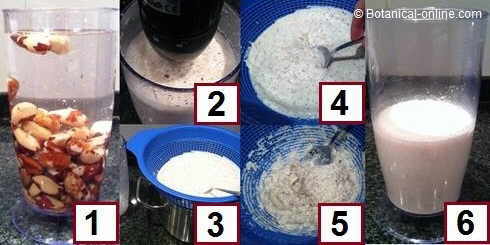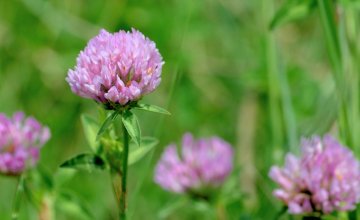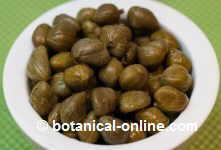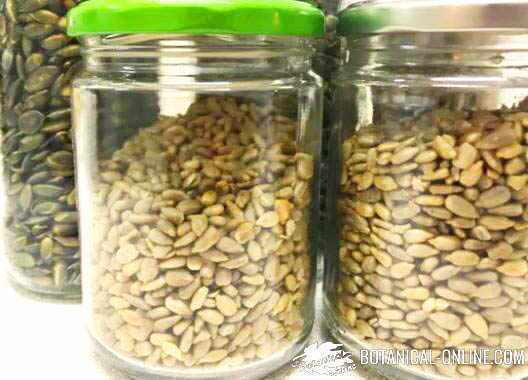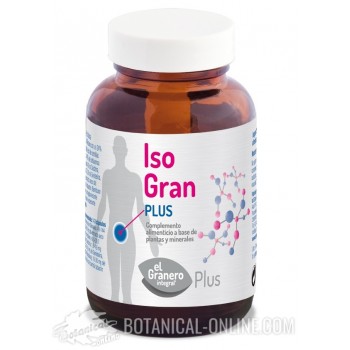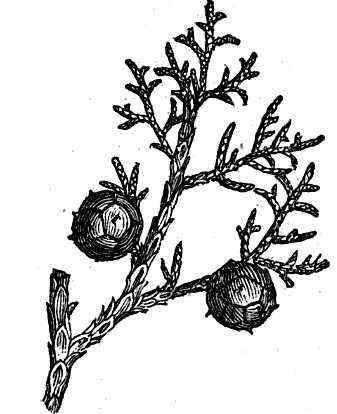Herbal treatment of Crohn’s disease
How to prevent or cure Crohn’s disease with natural remedies
Phytotherapy in the treatment of Crohn’s disease should be made by mutual agreement between the patient and the physician whom you must communicate a willingness to take some of these therapies.
Only under the surveillance and consent of the doctor, a patient with Crohn’s disease should take this treatment.
Sometimes the application of these treatments can interact with prescription drugs or react individually with the delicate bowel of the patient and be counterproductive.
Phytotherapy. Medicinal plants preparations for Crohn’s disease
Phytotherapy in the treatment of Crohn’s disease involves the use of a number of plants whose function is as follows:
- Plants to help relax inflammatory bowel irritation and swelling.
- Plants with healing properties that help restore the intestinal mucosa.
- Astringent plants that control excess of loose stools.
Medicinal plant preparations to treat Crohn’s disease
Among all the plants we could mention the following:
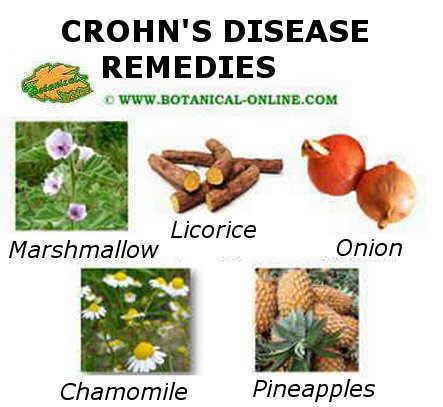
Some remedies used to treat Crohn’s disease
- Chamomile (Matricaria chamomilla) It has antiinflammatory and relaxing properties that can help reduce inflammation, prevent swelling and reduce pain. At the same time, its vulnerary properties can help prevent deterioration of the intestinal wall. (Infusion of one teaspoon of dried flowers for a cup of water. take 2 cups per day)
- Marshmallow (Althaea officinalis) Its richness in mucilages makes it suitable for treating irritated mucous. Similarly, the presence of tannins may help curb excess deposition. (Infusion of one teaspoon of dried leaves and flowers per cup of water for 10 minutes. Two cups daily)
- Rice (Oryza sativa): Enriched rice drink is the healthiest and most practical way to provide calcium for people suffering from digestive diseases.
- Mint (Mentha x piperita, Mentha spp.) The tannin content of this plant, the soothing and antispasmodic properties of menthol and its soothing powers for the intestinal mucosa can be exploited for treatment of abnormalities associated with an irritable bowel. (Infusion for 10 minutes of a teaspoon of the dried plant. Drink two glasses per day)
- Liquorice (Glycyrrhyza glabra) The root of this plant has antispasmodic and antiinflammatory properties for the gastric mucosa, which helps prevent or treat inflammation and prevent cramps (Infusion of a teaspoon of crushed dried root per cup of water. Drink 2 cups per day.)
- Psyllium: (Plantago psyllium): The seeds of this plant are very rich in mucilage. They can absorb excess water from a very watery stool, preventing constipation and soften stool, thus facilitating its expulsion and reducing the painful bowel movements that often accompany Crohn’s disease patients. (One tablespoon per a glass of water in the morning. Drink a couple of liters a day at least) (In case of adverse reaction, discontinue treatment)
- Onion (Allium cepa) because of its content in quercetin, it helps reduce inflammation. (Decoction of an onion skin in a liter of water. Drink the water resulting from this decoction throughout the day)
VITAMINS AND MINERALS FOR CROHN’S DISEASE
Supplements for the treatment of Crohn’s disease
The main function of vitamins, minerals and supplements in the natural treatment of Crohn’s disease is to correct the nutritional deficiency that take place in patients who, with the bowel problems, have many problems to suitably absorb the the necessary principles of food. Among the major recommended supplements, we would have the following:
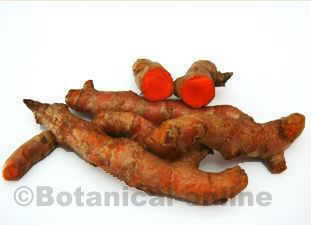
Turmeric
- Folic acid (Vitamin B9): These patients often have deficits of this vitamin both by poor absorption of it and the bad state of the intestine deteriorated by the influence of many drugs that interact with it. The ingestion of 400 mg daily of folic acid, combined with 200 mg of vitamin B12 can replace these deficiencies. Due to the problems of absorption of this last vitamin, it must often be supplemented with injections.
- Turmeric (Curcuma longa) (Capsules of turmeric extract are recommended) (You can also get an antiinflammatory diet by adding at the end of cooking 1 teaspoon turmeric in all recipes)
- Zinc: Most patients with this disease have low levels of zinc. Zinc is necessary, among other things, for healing wounds or ulcers, very common in these patients. The daily intake of 30 mg of zinc picolinate, combined with 2 mg of copper can restore the required levels.

Primrose flower
- Primrose oil: It has been verified that the essential fatty acids have the capacity to reduce the levels of prostaglandins. Primrose oil is rich in this type of oils (acid linoleic (Omega 6 and gammalinolenic acid), reason why the use of capsules of this plant in doses of 250 mg per day split into 3 doses may help reduce inflammation.
- Linseed oil: Its richness in Omega 3 essential fatty acid inhibits the action of prostaglandins and helps reduce inflammation. (Take a tablespoon of linseed oil each day)
- Fish oil: Just like flaxseed oil, it contains omega3 and can be used for the same purpose.
In addition to these food supplements, the diet is very important for preventing and reducing symptoms of this disease. A proper diet can be an alternative to using drugs when suffering attacks.
![]() More information on the diet of Crohn’s disease
More information on the diet of Crohn’s disease


